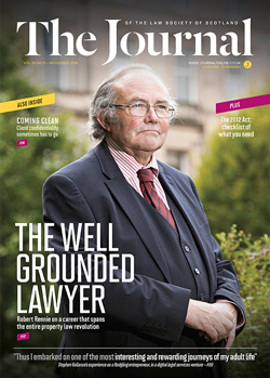Play to your strengths

September’s Sole and High Street Practitioners’ Conference, held in Dundee, once again provided a mix of legal updating – mainly the impending land registration changes – and sound business advice from those who have been round the course.
Despite some enforced last minute changes of speaker, the thought-provoking duo of Austin Lafferty and Stewart Brymer were on hand to deliver much practical, down-to-earth content on the business front.
Starting with the basics, Lafferty’s presentation, “How do you do law?”, pointed to the things that small firms have going for them, in that clients come in for one thing and sooner or later will need others; we can choose what work we do and what clients we take on; we have support networks; and we have a sustainable business model. The downsides of regulation, stress, uncertain markets and succession difficulties, are “all manageable”, he said.
Among other points from his talk:
- Good client data – when last consulted, type of business etc – is invaluable, and following up after a transaction is “hugely effective” in getting more business in.
- Think of the image your office presents to clients who call: does the place look a dump?
- If you don’t know about technology, get advice. Partners must not be blocks to progress.
Brymer described his own professional journey, joining what was a relatively small firm but which, with good leadership and an innovative approach, became highly successful. “Be out there, meet people, and deliver on your promises”, he advised. “And encourage people who have outside interests.” It was when he felt that he was under too much pressure to conform that he decided to leave. Since setting up on his own, in
the depth of the recession, he has “never looked back”.
Small firms should fear no one, he stated: the bigger firms probably don’t want your work. Social media is a “huge opportunity”, but most of your business will come from referral. If too much comes in, or the wrong sort, it’s good client relations to refer it on – but only to good lawyers who will give good service. “People buy people”, irrespective of the size of firm, and being in a small firm doesn’t make you inferior: “Some of the best specialists are on their own”. Cross-selling opportunities are “all around us”, and it’s down to each business to exceed client expectations. “Shatter perceptions!” he concluded.
Feedback time
Reporting on recent visits to local faculties, the President, Alistair Morris, emphasised the Society’s recognition that its income comes from its members – and with it, its ability to represent and regulate members and maintain the solicitor brand. Dealing with concerns raised, he first covered legal aid (“it takes up a disproportionate amount of my time”), inviting members to look out for the Society’s wide-ranging consultative review, since published. Secondly, court closures, where some practitioners felt the Society had not represented their interests sufficiently, but Morris said the Society had worked hard to build relationships with government in order to exercise influence, and it was in the interests of all the profession not to burn these bridges. Thirdly, the Council of Mortgage Lenders, which he said is now taking the Society more seriously and is working on revisals to its Handbook, though it will remain the case that solicitors take on contractual obligations when acting for lenders.
Advice on financial security and succession planning was presented by Alec Collie of Wesleyan for Lawyers – space does not permit more than a mention of his emphasis on the importance of the partnership agreement; the probability, even in small firms, of the death or serious illness of at least one partner or director before age 65; and the progress firms should now be making towards auto-enrolment of employees into a qualifying pension scheme.
In the final session, “Making Money from the Internet”, Dave Kerr of Moore Legal Technology urged lawyers to make better use of their websites – and to engage more in social media. Many sites, especially of smaller firms, just act as a “brochure” for the firm, and are obviously neglected. You should at least, he maintained, have some handle on what enquiries come in via these sources, and the conversion rate into actual business. A relatively small investment can greatly increase the number of enquiries and repay itself many times over. And regularly updated sites have a better chance of being found on a web search. Even better if you can blog about current affairs in such a way as to generate business.
Talking of investment and returns, you might think it surprising that such a tailor-made event, held on a Saturday near the end of the CPD year, didn’t attract more than 60 or so participants from the very sizeable small firm sector in Scotland. Hopefully those who did come along think they will reap the business rewards.
In this issue
- Age before duty
- Title to tissue
- Standing the test of time?
- Adjudication: a risk of abuse?
- Courts in all but name
- When is a person a “relevant person”?
- Reading for pleasure
- Opinion: John Scott QC
- Book reviews
- Profile
- President's column
- People on the move
- The designated day is here
- A tale of two systems
- LBTT: the rules and rates emerge
- The price of probity
- Play to your strengths
- Into the unknown
- A changing landscape
- Get the basics right
- Holiday pay: give us a break
- Money into thin air?
- Pathways to justice
- Flesh on the bones
- Scottish Solicitors Discipline Tribunal
- Streams of thought
- Over the finishing line
- Over the finishing line (full version)
- Law reform roundup
- The path less travelled
- The right kind of risk
- Frauds and scams – increasing awareness
- Ask Ash
- The process engineer's tale
- To disclose or not to disclose?






